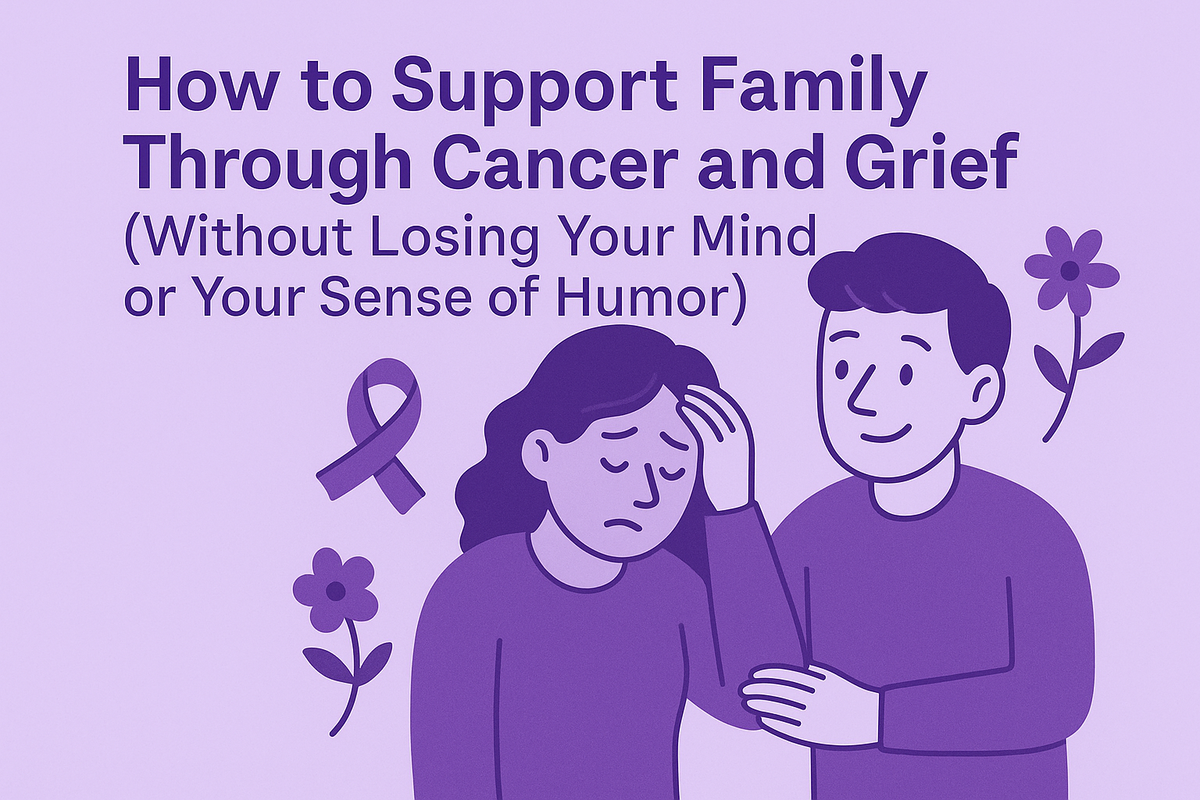How to Support Family Through Cancer and Grief (Without Losing Your Mind or Your Sense of Humor)

There’s no manual for this kind of news.
You hear the word cancer, and suddenly your brain is spinning faster than a toddler after their first sip of soda. Except this isn’t a sugar rush — it’s dread, confusion, and the weird urge to cry and make inappropriate jokes at the same time.
That’s where I am right now.
My aunt — the baby of three sisters, the Florida-living, tan-all-year, sarcasm-slinging soul I’ve known my entire life — is in the middle of that phase: the scan this, biopsy that, “we’ll know more next week” loop. We don’t have the official name of the monster yet, but we know it’s something.
And while I don’t see her often, she’s deeply close to my mom and her oldest sister. Watching them navigate this side-by-side, while feeling a little helpless from the sidelines, has taught me something unexpected:
Supporting a loved one through serious illness isn’t just about them — it’s also about what it brings up in you.
The Emotional Black Hole No One Warned You About
When someone in your family is suddenly in the we-might-be-dealing-with-cancer lane, it feels like the floor shifts underneath everyone.
You’re not the patient. You’re not the one in pain. And yet… you feel it anyway.
Emotional support becomes weirdly complicated:
You want to say the right thing — but there is no “right” thing.
You want to offer comfort — but everything feels too heavy.
You want to scream — but that won’t help anybody, including you.
This is where the mental health piece sneaks in.
Serious illness is a traumatic experience, not just for the person going through it but for their entire support system. It cracks open old wounds, activates survival mode, and pushes your emotional bandwidth to its limits.
When Your Brain Thinks It’s Helping (But It’s Not)
Let’s talk about the “helpful” voice in your head. You know the one:
“You’re not doing enough.”
“Why are you so emotional? It’s not even your body.”
“Pull yourself together — they’re the one suffering.”
Cool. Thanks, brain. Very unhelpful.
What this really is? Grief. Anticipatory grief.
Grieving the what ifs, the what nows, and the possibility that life as you know it might shift.
You’re allowed to have your own grief process — even if you’re not the one going through the tests or treatments. And yes — you’re also allowed to laugh during this time. In fact, I highly recommend it.
(Also: you’re allowed to hide under a weighted blanket or rage-color in a swear-word coloring book. Been there.)
The Hardest Things (and the Weirdest Ones)
You know what no one tells you?
Cancer doesn’t just bring fear. It brings paperwork. Appointments. Side effects. Dry humor. Sarcastic rage.
It’s this bizarre blend of:
- Holding back tears in waiting rooms
- Making jokes about “at least it’s not a brain tumor” (spoiler: sometimes it is)
- Googling survival rates at 2 a.m.
- Not wanting to talk about it, but also needing to talk about it all the time
Some days, you’ll cry.
Some days, you’ll meal prep.
Some days, you’ll laugh so hard you feel guilty.
And some days, you’ll just… shut down.
That’s all normal.
The mental load of watching someone you love navigate a black hole of medical unknowns? It’s heavy. It’s real. And it’s not something we talk about enough.
How to Actually Be Supportive (Without Self-Destructing)
We all want to “be there.” But what does that even mean?
Here’s the actual best way to support someone through a difficult time:
- Show up in small, specific ways.
“Can I bring dinner?” > “Let me know if you need anything.”
“Want memes or space today?” > “I’m here if you want to talk.” - Don’t spiritual-bypass.
Sometimes cancer sucks and there’s no silver lining yet. It’s okay to say, “This is unfair and awful.” - Let them lead.
Want to joke? Laugh with them.
Want to cry? Sit quietly and nod.
Want to pretend it’s not happening for a day? Absolutely. - Manage your own emotions… gently.
Feel what you need to feel. Don’t dump it all on the person who’s sick.
Phone a friend. Hug your dog. Cry in your car. It all counts. - Remember: You matter too.
This isn’t just their story. It’s your emotional story, too.
You can hold space for them while also holding space for yourself.
Mental Health Tips for Family Members During Serious Illness
If you’re like me, you probably:
- Forget to eat when you’re stressed
- Overthink every interaction
- Cry in grocery store parking lots
Here are a few actually doable mental health tools to try:
Energy check-ins
Rate your energy 1–10 each morning. Don’t try to fix the world on a 3.
Tame the guilt gremlins
You can’t be everything for everyone. You’re not abandoning them — you’re preserving you.
Journal like a petty raccoon
Not everything has to be deep. Just write what’s swirling so it doesn’t stew.
Hardcore grief recovery workbook
Schedule rest like it’s chemo
You don’t have to earn rest. You just need it.
Aromatherapy shower steamer
Lean on people who get it
Other caregivers and survivors just get it. Join a Facebook group. Text that one friend. DM me if you need to vent.
A Few Tools That Helped Me (or Might Help You)
These aren’t miracle cures — just small things that helped me (or someone I love) survive the chaos without fully unraveling.

This Amazon care package is one I’ve gifted to others — and honestly, I’d send it to myself again.

These shower steamers were my “I can’t afford a spa day” survival hack.

This weighted blanket = full-body exhale I didn’t know I needed.

This adult coloring book made me laugh and chill out — sometimes at the same time.

This grief journal gave my thoughts somewhere to land on the heavy days.
Affiliate links included — I only share what’s actually helped. If you click and buy, I may earn a small commission at no extra cost to you.
The Humor That Keeps Us Going
Yes, this situation is heavy. But humor doesn’t cancel out grief — it gives it room to breathe.
In our family, that might look like:
- Making “chemo-chic” jokes
- Sending memes about how hard it is to pronounce medical words
- Randomly shouting “This is fine!” while the world’s on fire
Sometimes the first step to surviving something this hard is just making it to the next moment without losing your mind.
Humor? That’s the survival tool no one puts in the pamphlets.
Final Thoughts from the Middle of the Unknown
We still don’t know what kind of cancer it is yet. We’re still waiting on answers.
But we’re showing up. One test, one laugh, one deep sigh at a time.
So if you’re in the messy middle with someone you love — you’re not alone.
You don’t have to have the perfect words.
You don’t have to be the strong one 24/7.
You just have to keep showing up — for them and for yourself.
And remember: this isn’t just about surviving the hard stuff.
It’s about finding slivers of light in it. Even if that light comes in the form of a stupid TikTok or a snort-laugh in the waiting room.
A Gentle Reminder for the Support Crew
You’re doing hard work.
Emotional support is hard work.
Let yourself rest. Let yourself laugh. Let yourself be human.
Because the best kind of support?
Comes from someone who’s honest, open-hearted, and just a little bit messy — like all of us.
By: Jess E
